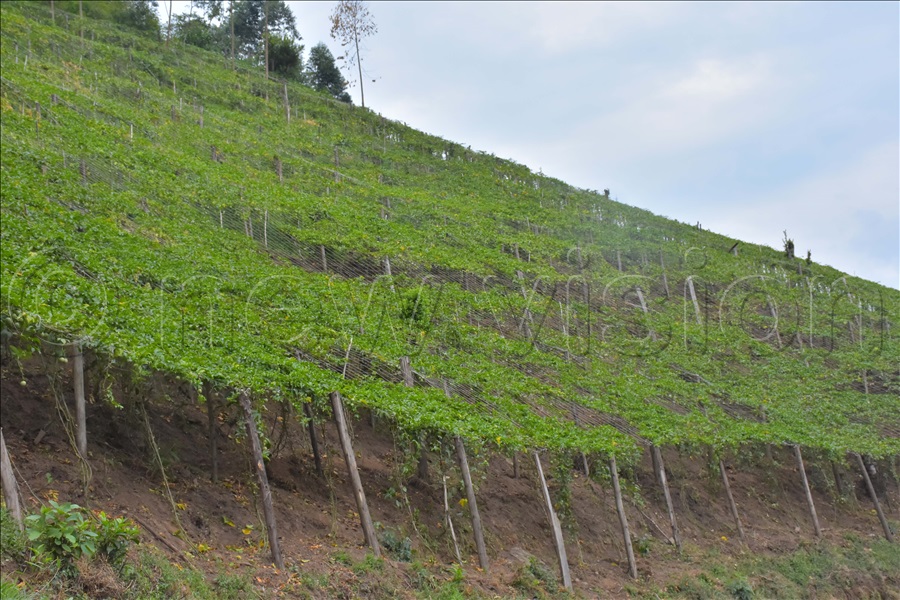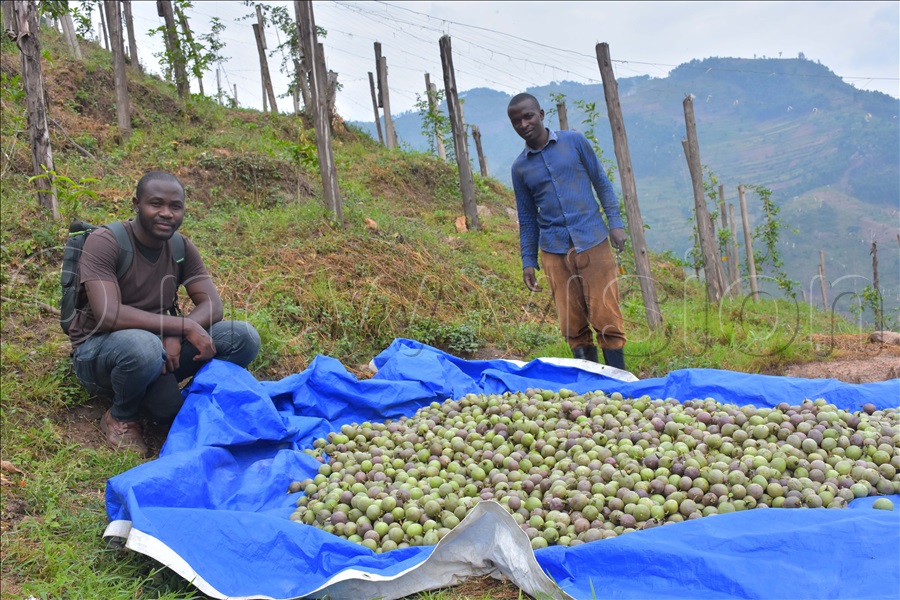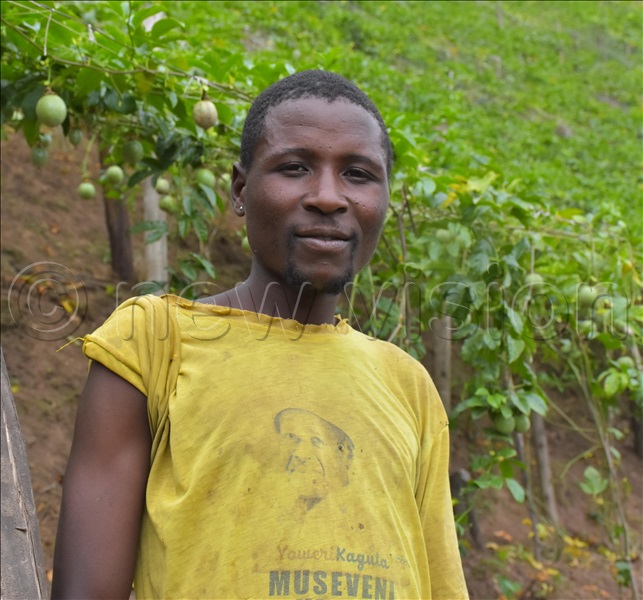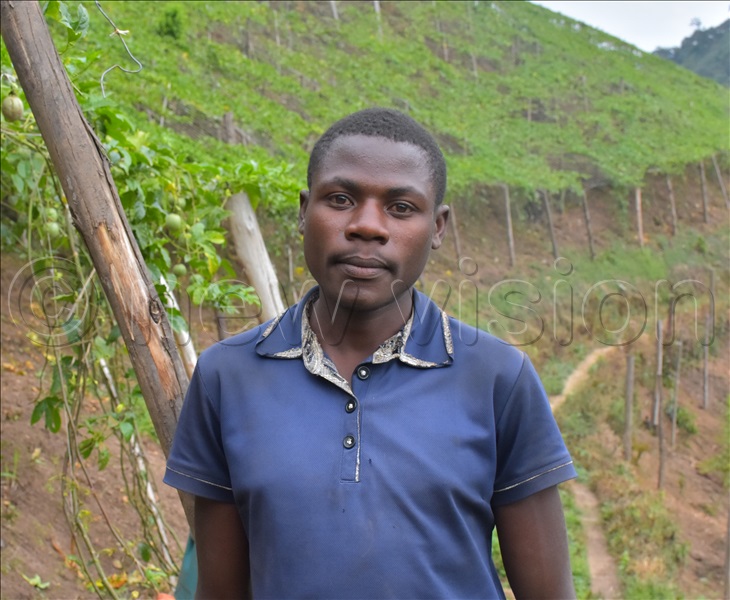By Julius Luwemba
In the hilly terrain of Ishaya village, Kinaaba sub-county in Kanungu district, where hills cascade into one another, is a 25 acre piece of land where Martin Byaruhanga established a passion fruit garden.
The 32-year-old Byaruhanga graduated with a Bachelor of industrial and organisational psychology from Makerere University in the year 2016, before venturing into the extraction of juice from mulondo (Mondia Whitei) in Kampala.
He was faced with the challenge of raw materials due to an unstable supply of mulondo roots.

According to Byaruhanga, very few farmers are known to specialise in mulondo growing, hence creating a production and supply gap between the plant to the market.
Growing passion fruits
Benchmarking from a friend’s farm garden in areas of Bukomansimbi
district, Byaruhanga developed an idea of growing passion fruits which he effected in September 2021.
He still bears a dream of establishing a juice factory which he says will be easy to manage if he gets a steady and stable supply of raw materials (passion fruits).
Sitting on 25 acres of land bordering Bwindi impenetrable forest, Byaruhanga’s passion fruit garden employs 25 permanent workers from the surrounding communities.

He had to withdraw all the capital (about sh20m) from his juice factory in Kampala and risked it to start the passion fruit garden.
“This is our family land. But I first utilised only four acres and I have been expanding gradually up to 25 acres now,” he noted.
Market
Byaruhanga harvests one tonne of passion fruits from his garden every week, selling each kilogram at sh 5,000.
“All this money used to expand my garden has been coming from the harvested passion fruits whose market is always readily available,” intimated the 32-year-old farmer.
There are several hotels in Kampala which provide instant and constant market for passion fruits.
Whereas there is a very long distance from Byaruhanga’s farm to the capital city- Kampala, cargo vehicles are always available to transport the passion fruits thus far.
Water supply
Located on the outskirts of Bwindi rainforest, Byaruhanga is always assured of cool weather and rainwater.
“You can see, the whole plantation is very green and in addition to the favourable weather, we have a standby generator to draw water from river Ishasha which flows just beneath my farm and also have sprinklers for irrigation in case the rain does not serve,” added Byaruhanga, pointing at the flowing water of river Ishasha which marks the boundary of Bwindi forest.
Bee-Keeping
Bee-keeping is an economic activity synonymous with the Bwindi area.
Before the Batwa ethnic tribe was displaced from Bwindi forest for the government to establish Bwindi national park, they were hunters and gatherers, who used to harvest wild honey.
Upon their displacement, they settled around the forest in the Bakiga communities where they continued to track and rear bees for honey.
Whereas, he is yet to make the first harvest from hives, Byaruhanga has tapped into the Batwa knowledge and so far set up 150 beehives in and around his farm with a welcoming signage reading,
“Keep silence, bees are busy.”
The cool and quiet serenity of the place makes it ideal for the stinging insects to live and breed.
He has since invested more money into the garden, all totalling sh100m.
Challenges
Fusarium wilt and root-rot are some of the main diseases affecting Byaruhanga’s passion fruits usually lead to premature drying.
He has, however, mastered the art of cross-breeding the passion fruit plants as an effective method of overcoming this challenge.
He also complains of an unstable workforce saying, some of the community members venture into different kinds of work and hence, sometimes, fail to turn up at the farm.
“I spend a lot of time training them about the proper management of passion fruits among other plants on the farm, but they later move to take on other ventures,” complains Byaruhanga.
He faces another challenge of lack of feeder roads in the hilly area. Workers have to carry the farm inputs or produce onto their heads, to or from the garden up to the main road.
The garden is situated on steep rugged terrain which limits some of the farm work deemed necessary for the growth of passion fruits among other crops.
It turns out to be more tiresome for workers to hike the steep slopes from one point of the garden to another.
The young farmer has also not been through rigorous training save for benchmarking from colleagues doing a similar thing.
He longs for any opportunities which can enable him to learn and apply more advanced farming methods.
Future prospects
Byaruhanga still harbours the dream of establishing a juice factory.
He believes that value addition is a sustainable remedy for agricultural products whose prices keep fluctuating due to the changing forces of demand and supply.
Having completed his Bachelor of industrial and organisational psychology in 2016, Byaruhanga is currently finalising legal studies at Kampala International University.
He studied Primary level at Bishop Mazzoldi primary school in Kanungu district and proceeded to St. Paul’s seminary Rushoroza, Kabale for O-level and St. Mary’s secondary school, Kitende for A-level before joining Makerere university.
What others say
Tina Katushabe, a passionate conservationist and tourism stakeholder, talks highly of Byaruhanga for having returned all the knowledge and skills to the community from where he grew up and for using farming methods that do not pollute the environment notably, Bwindi forest.
Alex Ndyenzaho

I have worked at this farm since it started and I cherish the energy and passion this young graduate is putting in, as his counterparts continue to search for jobs and entertainment in cities and towns.
Dennis Mukiga

This farm has helped to employ mostly women and children because the required work is not heavy nor tiresome compared to other casual jobs in this area.





